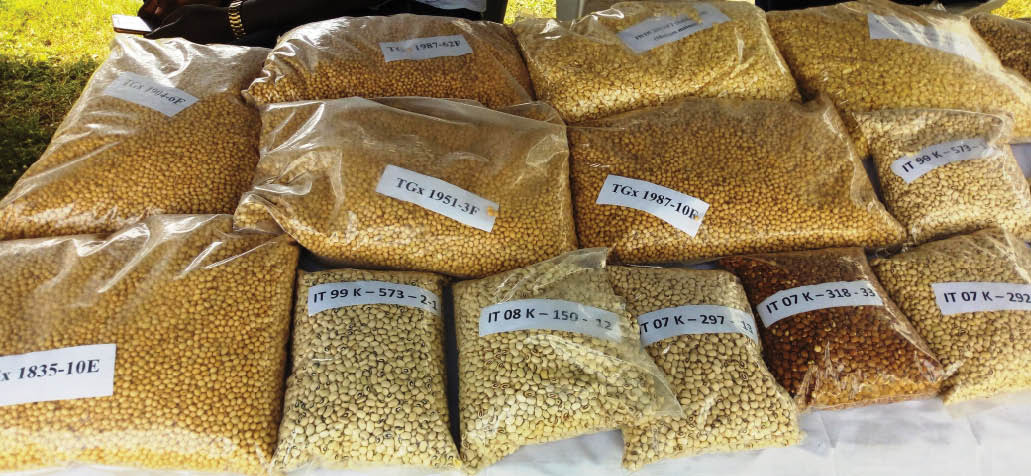Why access to farm inputs is declining
For many smallholder farmers, access to quality farm inputs is declining and several factors are responsible. Issues around the cost of inputs, insecurity, adulteration and the critical financial situation in the country have left many small-scale, medium-scale and even large commercial farmers struggling to survive. Besides these factors, cost of production has also been adding […]

Certified seeds
For many smallholder farmers, access to quality farm inputs is declining and several factors are responsible.
Issues around the cost of inputs, insecurity, adulteration and the critical financial situation in the country have left many small-scale, medium-scale and even large commercial farmers struggling to survive.
Besides these factors, cost of production has also been adding up to the farmers’ woes in the last few years.
Fertiliser
A few years ago, the Federal Government launched the Presidential Fertiliser Initiative (PFI) which was aimed at getting affordable fertiliser to farmers across the country.
PFI targets one million tonnes of fertiliser per annum and that has resuscitated at least 11 of the 33 moribund fertiliser-blending plants across the country thereby producing the current 20-10-10 and 15-15-15 NPK that was designed to reach farmers at N5,500 per bag.
For many peasant farmers, this is not the price that gets to them. Some dealers make it difficult for the smallholder farmers to afford the fertiliser amid reports of adulteration, which also makes it difficult for them to identify adulterated fertiliser because they lack technical knowledge.
In some markets across the country, the price of Urea fertiliser is still high; ranging from N7,000 to N7,500 for Indorama Urea, and even N8,000 for Notore Urea, which many farmers cannot afford.
A senior executive with Indorama Eleme Fertiliser and Chemicals Limited, makers of Indorama Urea, Dr. Balbir Singh, told Daily Trust in Abuja that the company had what it took to get the product to all the nooks and crannies of the country.
Dr. Singh said the company was producing 4,000 tonnes per day and that its management was assigning the complete quantity to the Nigerian market, and assured that until they satisfied the country’s demand, they would not export.
He said he believed the price of NPK was still higher than urea and cited imported NPK 15-15-15 that went for up to N8,200 in some markets.
He said urea was between N6,500 and N6,700 across the country, with the price even as low as N6,200 in places like Kaduna, Zaria, Kura in Kano, and in Sokoto State.
However, some farmers who spoke with Daily Trust said they bought above those prices, with a farmer putting the price at N7,800 in Akwanga, Nasarawa State.
The General Manager of the Fertiliser and Chemicals plant based in Kaduna, Mr. O.P. Pandya, however, told Daily Trust that the company blended special fertiliser for both individuals, the Maize Association of Nigeria (MAN), the Central Bank of Nigeria (CBN) agricultural programmes and the PFI in their 500,000-tonne capacity factory and that prices varied.
Insecurity impacting negatively on inputs sales
In the last two years, the sale of agro-inputs to farmers has been dropping in many states due to persistent conflict between farmers and herdsmen across many agrarian communities.
Many farmers have become Internal Displaced Persons (IDPs) and more recently, kidnappings have forced many farms to close down.
Mrs. Elizabeth Jibrin, a retired federal director, has not been able to visit her farm since October, 2018 due to the spate of kidnappings Abuja-Keffi road.
Mrs. Jibrin shared horrific stories of farmers relocating from their areas because of the activities of kidnappers who she called “apostles of evil.”
Alhaji Saidu Garba, Secretary of the Agro Dealers Association of Nigeria, Kaduna State chapter, in an interview on Tuesday, said there was a drop in the inputs supply this year, and that the little they had, patronage was low because of insecurity.
Alhaji Garba lamented that, “Honestly, many people have not returned to their farms.”
Quality seeds beyond many farmers
Although the country has a shortfall of over 300,000 tonnes of quality certified seeds, the available ones are still beyond the reach of many farmers.
For example, 25kg of certified rice variety costs N10,000 to N12,000 and a farmer needs four bags for a hectare, which amounts to between N40,000 and N48,000.
Secondly, adulteration has made some farmers who cannot reach the seed producers directly lose confidence in what is sold in the market because most times the germination rate is poor.
A lot of the fake seeds are still in the market, something the Director General of the National Agricultural Seeds Council (NASC), Dr. Philip Ojo, said they were poised to fight until they defeated it and other underhand activities in the seed-value chain.
However, the Seed Bill passed by the National Assembly, which will tackle this ill has been rejected by the president and is now before the National Assembly again.
Cost of agro-chemicals go up daily
Alhaji Baba Adamu, a farmer in Kwali Area Council of the FCT, in a chat with Daily Trust, said the prices of agro-chemicals had been rising since 2017.
“What I bought with N1,200 in 2016 is now sold for N2,200. In fact, Soluto, the selective herbicide I bought for N,3000 in 2016 is now sold for N5,500, and you need to buy four to five bags for a hectare,” he said.
Succour for smallholder farmers
For many smallholder farmers, special intervention programmes like CBN’s Anchor Borrower Programme (ABP) are helping in changing the narrative.
Various crops enlisted under the ABP are helping the farmers bridge the divide.
Rice has seen a revolution courtesy of ABP. A similar programme was launched recently for cotton, oil palm and other crops. This, it is hopep, will bring succour to many farmers.
